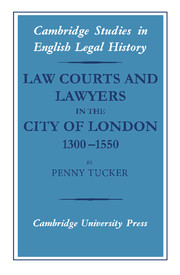Book contents
- Frontmatter
- Contents
- Acknowledgements
- List of abbreviations
- List of figures
- Introduction
- 1 The administration of the law by the city in context
- 2 The distinctiveness of city law and custom
- 3 The city law courts
- 4 The administration of the law in the city's courts: I
- 5 The administration of the law in the city's courts: II
- 6 Judges, jurors and litigants
- 7 The city's law officers
- 8 Legal representation in the city
- 9 The effectiveness of the administration of the law by the city
- 10 Interchange and exchange between the city and the common law
- Appendices
- Bibliography
- Index
6 - Judges, jurors and litigants
Published online by Cambridge University Press: 04 August 2010
- Frontmatter
- Contents
- Acknowledgements
- List of abbreviations
- List of figures
- Introduction
- 1 The administration of the law by the city in context
- 2 The distinctiveness of city law and custom
- 3 The city law courts
- 4 The administration of the law in the city's courts: I
- 5 The administration of the law in the city's courts: II
- 6 Judges, jurors and litigants
- 7 The city's law officers
- 8 Legal representation in the city
- 9 The effectiveness of the administration of the law by the city
- 10 Interchange and exchange between the city and the common law
- Appendices
- Bibliography
- Index
Summary
INTRODUCTION
This chapter examines developments in relation to the laymen who played their parts, in and out of court, in the administration of the law by the city of London. The reason for examining these developments is that the character of tribunals inevitably owes a fair amount to the character of its presiding judges, and the nature and quality of the judgments will be affected both by the judges and by anyone else who is involved in arriving at those judgments. If city judges differed in their backgrounds, attitudes and practices from the Westminster judges, and indeed also from those in other inferior courts, the city courts themselves are likely to have differed from other courts. Jurors, too, were judges of a sort in some instances: judges of the fact. Given the prominent place accorded to the jury in the history of the common law, the composition of city juries during the Middle Ages warrants detailed examination. And, as we have seen, the jury as a method of trial also occupied a fairly prominent position in the city courts. Litigants can also affect the character and workings of a court. Their influence is not always as obvious as that of judges and juries. In our period, however, when both courts and laws were developing, often at local level, litigants almost certainly affected that development.
- Type
- Chapter
- Information
- Law Courts and Lawyers in the City of London 1300–1550 , pp. 211 - 239Publisher: Cambridge University PressPrint publication year: 2007



